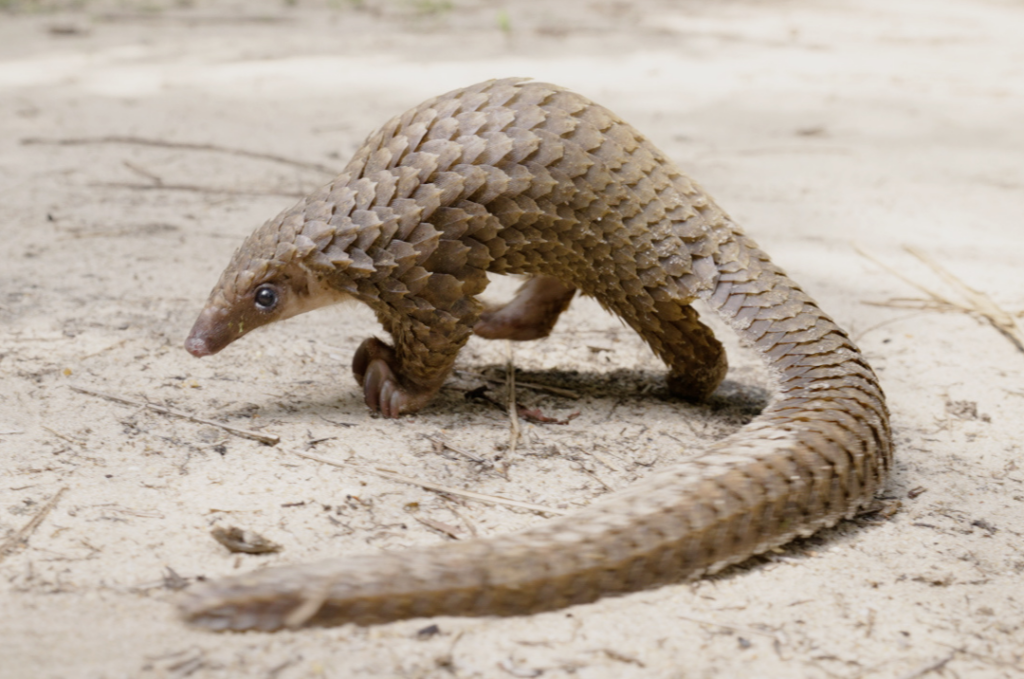
For Jennifer Biffot, her home is more than just a place; it’s a heritage of landscapes, stories, and people that she treasures. Growing up in Gabon, Jennifer’s love for her homeland’s natural beauty and unique traditions shaped her dream of sharing this vibrant culture with the world. But there was a problem: some of the longstanding traditions were putting unsustainable pressure on the very forests and wildlife that made her homeland special.
As the forests faced increasing threats, Jennifer saw that the stories, traditions, and identity of her home were also at risk. How could she help protect both the wildlife and the communities that define Central Africa?
The answer was to tell a new story.
Today, as WildAid’s Francophone Africa Representative based in Cameroon—a country that shares an ecologically rich border with northern Gabon—Jennifer works to inspire new traditions that honor both people and nature. Her focus is on pangolins, often called “guardians of the forest,” a species vital to the health of these ecosystems. Through sustainable practices and community engagement, Jennifer’s mission is to protect the forest and the culture she holds dear.
While many people prioritize getting their children to school or bringing food to the table, Jennifer saw an underlying issue: some of that food was bushmeat, which, though rooted in tradition, was having devastating consequences on the environment. While people genuinely care about their heritage, they often overlook how certain practices are endangering the very ecosystem that sustains it.
“There was this issue of how to keep the culture and tradition, but also preserve wildlife and habitat,” Jennifer recalled.
That’s where pangolins come in.
Traditionally pangolin meat has been served in important meals for generations in Cameroon. It’s considered a rare and special delicacy, saved for events like weddings, funerals, or other ceremonies. But that doesn’t make the consumption of pangolin meat uncommon.


“Even young people today continue to eat [pangolin meat] because it’s been transferred from generation to generation,” noted Jennifer. It’s what their parents ate and what their grandparents ate before them.
Pangolins, sometimes called “scaly anteaters,” have an irreplaceable role in the ecosystem. They control insect populations, particularly ants and termites, and improve soil health by digging, allowing for better nutrient cycling. In Cameroon, these “guardians of the forest” support biodiversity and have been part of Cameroonian culture for decades, making them vital to the environment and tradition.
Despite this, pangolins are the most trafficked wild mammals globally, driven to the brink of extinction by illegal hunting for their meat and scales.
Jennifer entered her role knowing that she had to win over the local Cameroonians by preserving traditions while also protecting this key guardian of forest ecosystems. It was not an easy task.
“If this species disappears, part of Cameroon’s [natural] heritage will disappear as well,” said Jennifer, “then we lose the whole story of the country, the whole identity.”
To keep that larger story alive, Jennifer helped WildAid launch a significant public awareness campaign targeting urban areas in Cameroon. The goal was to reduce the consumption of pangolin meat and highlight the critical role pangolins play in maintaining environmental balance.
Using outlets such as television, radio, social media, and billboards, Jennifer saw firsthand a new appreciation for the role pangolins play in the natural environment and an increased awareness of how their survival or extinction
could impact the livelihood of many Cameroonians. Even journalists and the government became more interested in the work.
Pangolin meat may be part of celebratory and traditional meals, but natural heritage is also important for many Cameroonians. Together with WildAid, Jennifer helped inspire pride and action by presenting a new story, one that featured the pangolin as a symbol of Cameroon’s leadership in conservation. In just two years, her efforts led to a 26.7% reduction in the number of Cameroonians who eat pangolin at least once a month.
Jennifer always knew that Cameroon and her home country of Gabon have amazing ecosystems and rich cultural traditions, and for her, working with WildAid is the perfect way to help keep the stories of her home, and its pangolins, alive and well.


Will you help us ensure this work continues by making a gift today?
Your generosity is critical to sustaining these efforts. Because of Jennifer’s and WildAid’s efforts, 67% of Cameroon’s urban residents now support the protection of pangolins.
Please consider making a gift today to help us safeguard wildlife, habitats, and the future of conservation. Every donation made before the end of 2024 will be matched, dollar for dollar, up to $300,000!
Your donation can help change the fate of an entire species.
Stay in touch and get the latest WildAid updates.
SIGN UP